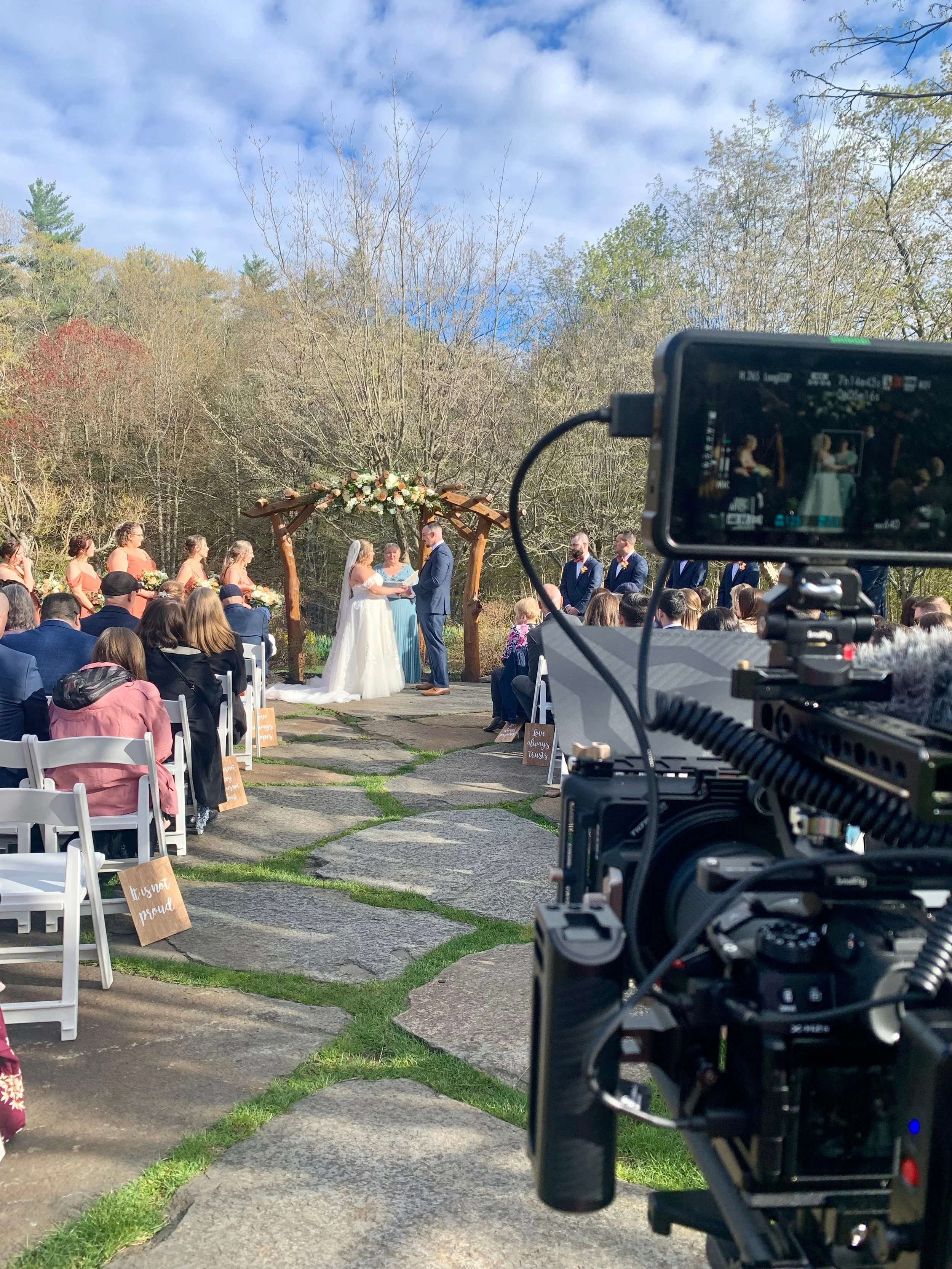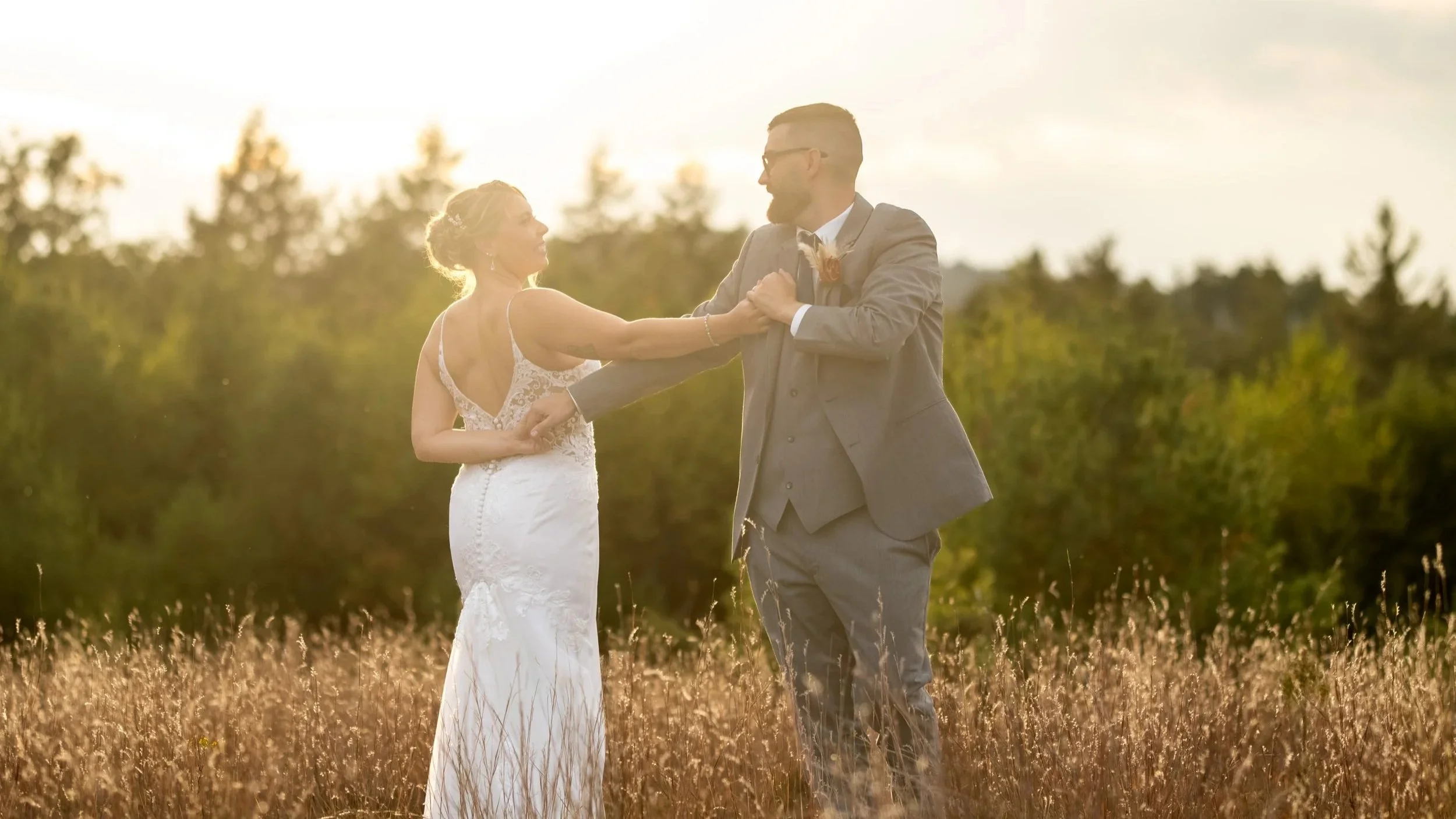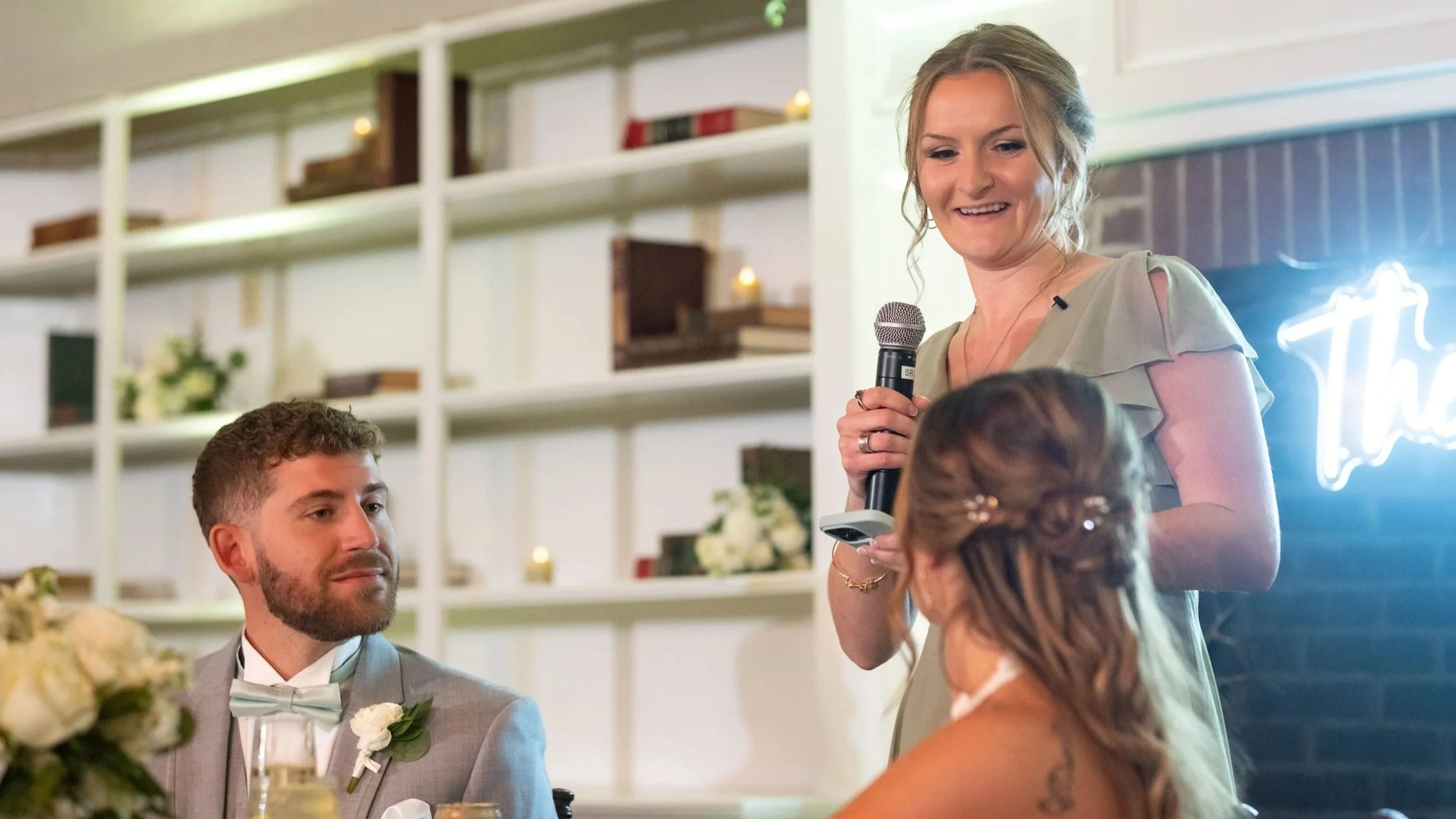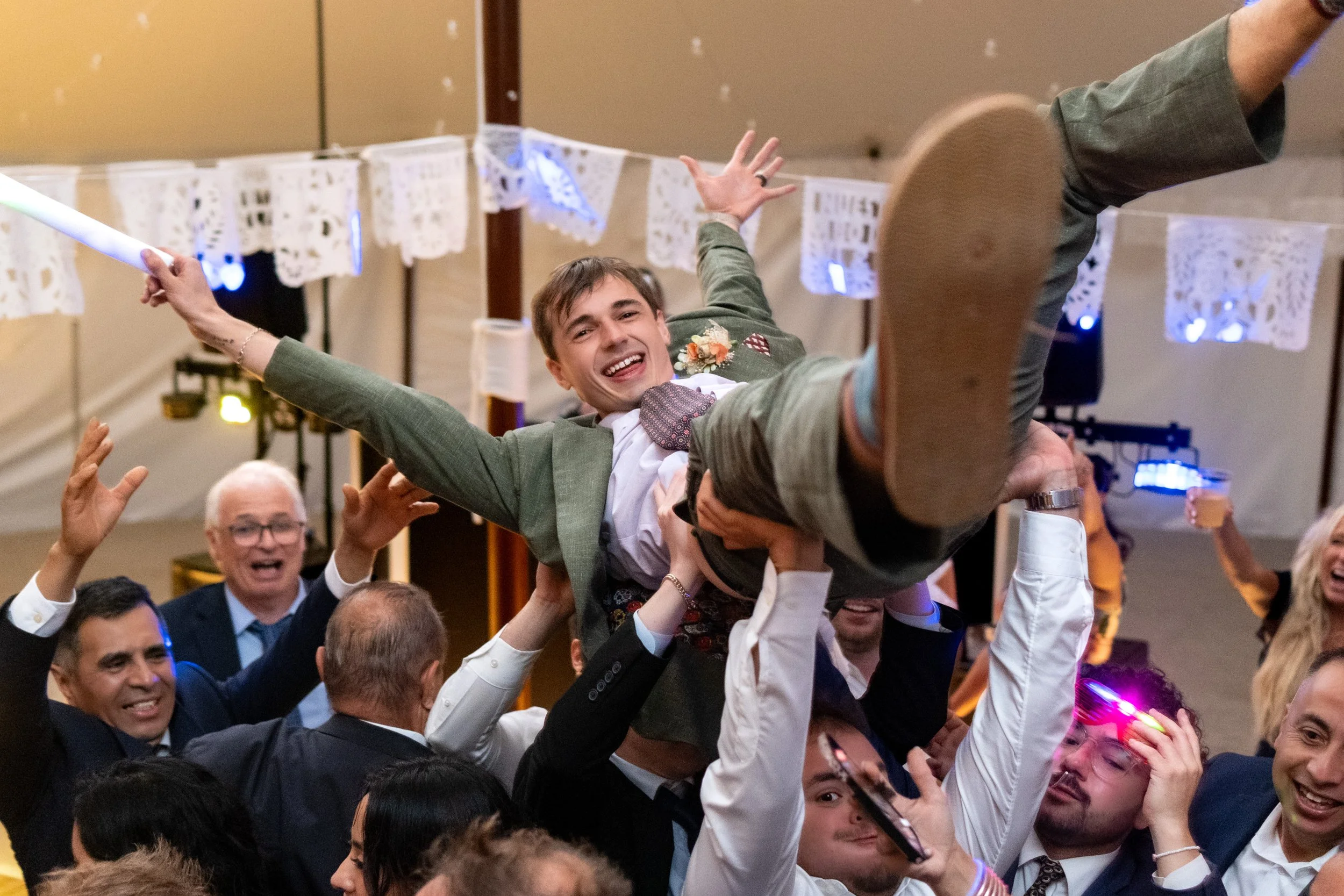Maine Wedding Videography Guide
What to Know, What to Ask, and How to Choose the Right Videographer for Your Day.
When you start researching videographers, it’s easy to feel overwhelmed. There’s a lot to compare — styles, prices, deliverables — and no two companies do things the same way.
This guide is designed to help you navigate the process with confidence. You’ll find the key questions to ask, what to look for in a professional team, and a few insights from over a decade of experience capturing weddings across New England.
Finding a Style That Fits You
Documentary
This approach focuses on recording your day as it unfolds — the full ceremony, speeches, and first dances in real time.
Cinematic
This style is emotional and creative, designed to feel like a short film. You’ll see slow pacing, artful movement, and layered sound design.
Hybrid
Many couples choose a blend. Cinematic for emotion, documentary for memory. The balance depends on how you want to relive your wedding day.
“The best wedding films feel like your memories — not a production.”
Understanding Pricing & Packages
Wedding videography can range widely in price, and it’s not always easy to see why. Here’s what typically affects cost:
Experience & Team Size: A seasoned team knows how to anticipate moments and adjust under pressure.
Coverage Hours: More time means more footage and editing.
Number of Videographers: Two or more cameras give better angles and ensure no moment is missed.
Editing Style & Deliverables: A highlight film, documentary edit, or teaser all require different editing time.
Audio & Lighting Quality: These are what elevate a video from amateur to professional.
Pro Tip: Don’t just compare price tags — compare what’s included, how the team captures audio, and how they edit.
Capturing the Sound of Your Wedding Day
When couples picture their wedding film, most imagine the visuals — the dress, the venue, the light. But sound is just as important. The laughter, vows, and cheers bring the film to life.
At VMG, we record your day using multiple layers of audio to ensure nothing is missed:
-
We record exactly what guests hear — a clean, balanced feed that serves as the base layer for your audio.
-
Hidden, reliable mics that capture vows, toasts, and first looks naturally without distraction.
-
These capture the room’s warmth — the laughter, applause, and emotion in real time.
When blended together, these layers create a soundtrack that doesn’t just record your day — it feels like it.
“Your film should sound as good as it looks, because emotion lives in the audio.”

Questions to Ask Before You Book
Here are some thoughtful questions to ask before you book your wedding videographer, plus why they matter and what to listen for when comparing teams.
-
Every videographer approaches a wedding differently. Some focus on cinematic storytelling with slow, emotional, movie-like moments. Others capture the day in a more documentary style.
I’ve learned that the best wedding films find a balance between the two. For highlight or teaser films, I lean into cinematic movement and lighting to create something dreamy and emotional. But I also keep a documentary mindset to make sure key moments like your ceremony, vows, or first dance are captured in full with multiple angles and clean audio.
Why it matters: You only get one shot at your wedding day. A good videographer should be able to capture both the emotion and the full story without missing anything.
-
Every wedding has its own rhythm. Some are calm and intimate, others are lively and fast-paced. Your videographer should be able to read that energy and adapt.
I describe my approach as “fly on the wall with guidance.” I blend in quietly when needed, but I’ll step in to guide you into good light or help shape a moment so it looks as beautiful as it feels. The goal is for you to feel like you have a friend filming, not a production crew following you around.
-
Trendy edits come and go. A timeless film still feels real twenty years later. Ask how your videographer balances creativity with storytelling that lasts.
When I edit, I focus on honest emotion and natural pacing. Every shot should help you relive the day, not just watch it. Lighting, movement, and sound design should feel authentic to your experience, not like a copy of what’s popular online that year.
-
Price can vary a lot, and not all packages are built the same. When comparing, ask:
How many hours of coverage are included?
Is there one videographer or a full team?
Are travel or drone fees extra?
What edits are delivered (highlight film, full ceremony, speeches, teaser, etc.)?
Is professional audio included?
Pro tip: Cheaper doesn’t always mean better value. Look for experience, consistency, and how a company manages lighting, audio, and editing. Those are the details that make the biggest difference in quality.
-
The number of videographers you need depends less on how big your wedding is and more on how your day is structured.
Some smaller weddings still benefit from multiple videographers, especially when events happen in different places at the same time. If one partner is getting ready offsite while the other is at the venue, or if the ceremony and reception are in separate spaces, a team helps make sure nothing is missed and transitions stay smooth.
Other weddings, especially when everything happens in one place or the guest list is small, might only need one or two people. If you have around thirty guests, a four-person crew could feel more like paparazzi than storytellers, which can take away from the moment.
That’s why we scale coverage to fit your day instead of locking you into a standard team size. Sometimes a hybrid approach works best — starting with three videographers for morning prep, details, and ceremony angles, then having one or two head out once things slow down later in the evening.
-
Lighting can completely change how your film looks. Ask how your videographer works in low light, bright sun, or dim indoor spaces.
We use off-camera lighting during darker parts of the day, like toasts or first dances, to keep everything clean and flattering. We also plan for golden hour to capture that soft, glowing light that gives your film its cinematic look.
-
Clear, emotional audio is what separates a polished wedding film from an average one. Ask what systems your videographer uses to capture vows, speeches, and natural sound.
At VMG, we record multiple layers of audio — a direct feed from the DJ or band, lavalier mics for key moments, and ambient mics to capture laughter and applause. Those layers are blended together so your film sounds as real as it felt in the moment.
-
Drone footage can add amazing perspective, but it’s important that the operator is licensed and insured. Some venues also require permits.
We use drones for cinematic establishing shots when conditions are right, but we always prioritize safety, guest comfort, and the venue’s rules.
-
Not every videographer offers the same type of finished film. Understanding the difference helps you compare packages more clearly.
Some focus only on highlight films — short, emotional recaps that blend music and quick edits. They can be beautiful, but they’re only part of the story.
Ask if your videographer also offers documentary-style edits that include full coverage of your ceremony, speeches, or dances. These are the moments you’ll want to revisit years later — the vows, the laughter during toasts, and the reactions that don’t fit into a short highlight.
A skilled videographer should be able to do both. Cinematic touches should enhance the story, not cover for missed footage or weak audio.
Good questions to ask:
Do you film and deliver full-length edits of key moments like the ceremony or speeches?
How do you balance b-roll and natural audio when telling the story?
Is your highlight film built from strong documentary coverage, or do you rely on b-roll to fill gaps?
Using b-roll should be a creative choice, not a way to hide missing coverage. The best films come from consistent storytelling, solid coverage, and an editor who understands how to craft both short and long-form films that hold up over time.
-
A good videographer knows how to collaborate. We always aim to work smoothly alongside photographers so everything flows naturally.
Everyone on our team has experience shooting both photo and video, which helps us anticipate what photographers need while getting what we need for film. Some photographers like to include motion in their posing, while others are more traditional. Either way, we adapt. At the end of the day, we all want the same thing — your story captured beautifully.
-
Every company handles this differently, but most follow a booking fee and balance structure.
We typically require a booking fee to hold the date, with the remaining balance due before the wedding. The key is transparency. Your payment schedule should be clear, simple, and written into your contract.
-
Turnaround times can range from a few weeks to several months depending on the season and the depth of editing.
Ask what’s included in your timeline — teaser, highlight film, full documentary edits, or social clips. Quality editing takes time, but clear communication helps set expectations.
-
Ask about how your videographer stores and backs up your footage. It’s something couples rarely think about until it’s too late.
We record to multiple memory cards at once and back everything up that same night to separate drives and cloud storage. It’s not the glamorous side of filmmaking, but it’s what protects your memories.
-
No wedding day runs exactly as planned. Weather, timing, or sound systems can all create challenges. What matters most is how your videographer handles them.
Many of the systems and backup steps we use today came from lessons learned early on. Every improvement we made started with asking, “How can we make sure this never happens again?” You want someone who’s transparent about their process and confident in how they adapt when things change.
-
This is the most important question to ask, and the answer should go deeper than “our style.”
At VMG, we focus on creating a film that feels like you. Every decision — from camera angles and sound design to pacing and color — is about authenticity. It’s not just about capturing what happened but how it felt.
Ready to Start the Conversation?
We hope this guide helps you as you plan your wedding and find the right team to capture your story. Choosing a videographer is about more than just a style, it’s about finding someone you connect with and trust to tell your story authentically.
If you like our style and vibe, we’d love to chat about potentially capturing your wedding day.








